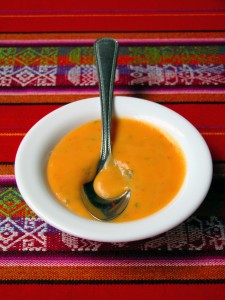
 There’s nothing like soup when you’re sick. Don’t get me wrong, on a cold day, I love a nice warm cup of soup – hot and sour to be precise – but for some reason, it just tastes all the better when I am sick. Maybe, it is because I used it as a substitute for my mother’s chicken soup when I was ill and away at school. Or maybe, it’s that I have created some psychological link of “feeling better” once I have had my soup.
There’s nothing like soup when you’re sick. Don’t get me wrong, on a cold day, I love a nice warm cup of soup – hot and sour to be precise – but for some reason, it just tastes all the better when I am sick. Maybe, it is because I used it as a substitute for my mother’s chicken soup when I was ill and away at school. Or maybe, it’s that I have created some psychological link of “feeling better” once I have had my soup.
Now, this post is not about the medical benefits of soup, nor about how soup can replace some modern medicines that create relief, like our good friend the wonder drug aspirin. But upon reading a recent article, linked here, I started thinking about how much of the healing process is reliant upon the belief that something is working. The article discusses the so-called “care effect”, and rehashes a study in which placebo acupuncture was administered under two contexts – in one group patients were “treated” by a warm and caring practitioner, while the other group received the same placebo acupuncture but by a brusque practitioner. We have all heard the stories of the patient who had a miraculous recovery because of the belief and support of the people around them while another patient with the same condition did not overcome the hardship. What was different between the two – the family, the surroundings, or maybe just the attitude of the doctor?
The medical school admissions process has become so competitive that students are often over-extending themselves; they work in labs to gain research experience, volunteer at a hospitals or clinics to gain clinical experience, give up weekends to work with a charity, all to tick off the boxes they believe they need in order to gain entry into medical school. But there is warrant to taking a pause, to check in and see if these students, our future physicians, are learning the art of caring. The art of encouragement. The art of the power of the smile. The art of compassion.
Oddly enough, the role of the advisor is not that different from that of a physician; both are often overworked and under-resourced. However, it’s important to make sure that we’re extending the care effect to our students; after all, if we’re not demonstrating traits like compassion and understanding for them as undergraduates, how can we expect them to integrate those skills as they advance through their medical education? These skills, coupled with the scientific knowledge of medicine, are what makes great doctors. Relatively speaking, its easy to learn the medicine but the art of healing is a skill that takes years to master, and the best time for our pre-medical students to learn that skill is now!


